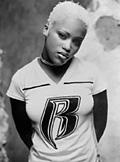Hip-hop’s first don was Russell Simmons, who in the early ’80s partnered with a longhair named Rick Rubin and converted the latter’s New York University dorm room into a makeshift recording studio and office for their joint venture, Def Jam Records. Before long, they’d salvaged an LL Cool J tape from the demo pile and brought the Queens whippersnapper in for a session, the beginning of what would become 15 years of nearly unrivaled commercial success in the hip-hop industry. True to his impresario status, though, Simmons soon removed himself from the music-making side of Def Jam, preferring instead to politic at parties and talk up what his partner was doing back in the lab. (Disclosure: I work for a company founded by Simmons, though it’s no longer owned by him.)
Throughout the ’80s, many hip-hop indies came and went—Wild Pitch, Cold Chillin’, Sleeping Bag, Macola, and so on—but no one individual had the charisma of a Simmons, a key reason that many of those labels remained independent, while Def Jam signed a lucrative distribution deal with Columbia.
Finally, in the mid ’90s, a pair of labels sprouted up that seemed worthy of the Def Jam legacy, their founders ripe to claim Simmons’ throne. In Los Angeles, a former bodyguard named Suge Knight made a major splash with Death Row records, the first label other than Ruthless to capitalize on gangster rap’s soon-to-be-nationwide popularity. Out of New York, Sean “Puffy” Combs’ Bad Boy came as an answer, a reassertion of the hip-hop birthplace’s genre dominance.
But what could have been family love became mob war. Knight called Combs out on the carpet at the 1995 Source Awards. One of Knight’s associates was shot in Atlanta. 2Pac was robbed while entering a New York recording studio. Later signed to Death Row, he recorded the scathing “Hit Em Up,” a mentally unhinged tongue-lashing directed at anyone with a zip code under 30000 and claiming, among other things, to have slept with Faith Evans, Biggie Smalls’ wife. Soon after, Pac was killed on the Las Vegas Strip. Six months later, Biggie Smalls was killed in Los Angeles.
Meanwhile, down in Louisiana, Master P was building his No Limit empire, anticipating the fall of Puff and Suge and his own consequent ascendance. Naturally, P was dealing with his own small-scale civil war, trying to move beyond a long-standing violent beef with another New Orleans label, Big Boy (former home of Mystikal). As East and West were tearing each other down, P slowly attacked the mainstream, in the end securing himself a place on the Forbes list of the highest-paid entertainers in the country, not to mention permanently altering the accent of urban radio.
Today, Suge is in prison, Puff’s just narrowly escaped a sentence of his own, and Master P has gone from classy to ashy in a frighteningly brief span. What happened to hip-hop’s leading men? Once an elite group, the genre’s spread, and resultant infighting, has left a trail of would-be leaders in its wake. Whatever hope for unity there once was has since been replaced with a presumption of ill will. Furthermore, the idea of a true hip-hop don seems almost anachronistic right now. With the genre so stratified and localized, no one individual could hope to achieve the notoriety and respect of a Russell Simmons in his prime. There’ll always be someone else, somewhere else, aiming to take over.
Ironically, of this fallen trio it’s Suge who’s got the most promising future. Even though his release from prison, originally scheduled for early this summer, is far from confirmed (it’s dependent upon good behavior), Death Row is alive and kicking. Its most recent release, a double-CD of unheard 2Pac material called Until the End of Time (clearly a reference to the release schedule of unheard Pac material), debuted at the top of the pop charts earlier this month, moving over 400,000 units. Other recent Death Row releases—Too Gangsta for Radio, the unreleased Snoop material on Dead Man Walkin—didn’t sell as well, but certainly made a stink in the hip-hop world. Even a new tell-all documentary, Welcome to Death Row, which exposes the connections between Knight, his lawyers, and L.A. drug kingpins, has failed to derail the Death Row train. Next month, Death Row will reissue its entire back catalog with enhanced video content. Not bad for a label controlled by an imprisoned don who can’t have any input into his company’s business affairs.
If anything, the sad affairs of Puff, Suge, and P prove that the lifestyle of hip-hop is a short-lived one that only eats its passengers. What Suge’s pseudo-retirement success reveals is that hiatus—forced or not—may be the key to long-term survival. Puff, take note—next time, take the rap, or go do yoga with Russell.








